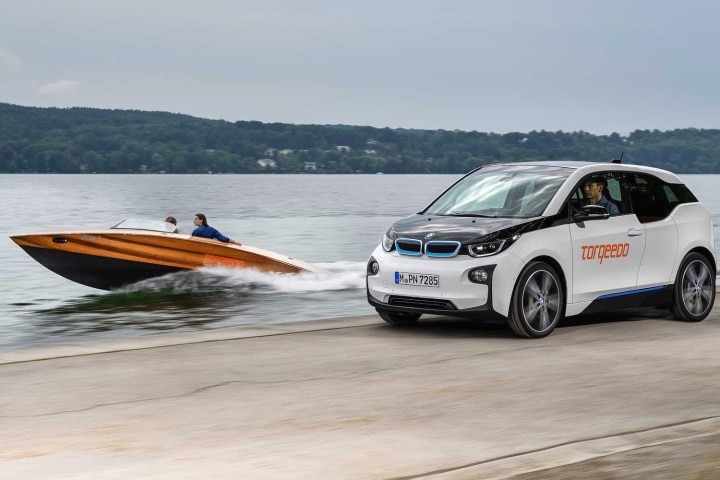
BMW i3 battery packs will soon hit the waves as the power source for Torqeedo’s line of Deep Blue inboard and outboard electric motors, which offer up to 160 horsepower. Torqeedo claims the i3-sourced pack will offer the highest energy density of any battery pack in boating, meaning it crams a larger amount of energy into a given volume.
Torqeedo claims its electric powertrains can provide five hours of operation per charge, when traveling at 4 knots (around 5 mph). The range goes down at higher speeds. The company is currently selling a 30.5-kilowatt-hour version of the BMW i3 battery pack starting at $31,999, while the electric motors start at $23,999. The first BMW-powered boats are already in operation, according to Torqeedo.
The battery pack appears to be in a different configuration from its original automotive application. The i3 launched with a 22kWh battery pack, providing 81 miles of range. For 2017, BMW added a larger 33kWh version to the lineup, with 114 miles of range. BMW also sells the i3 REx, which uses a two-cylinder gasoline engine to charge the battery on the go, boosting range.
The Torqeedo tie-in isn’t the first example of BMW trying to find a use for its i3 battery packs outside cars. Last year, the automaker announced a partnership with Germany’s Beck Automation to use i3 battery packs for home energy storage. That involves using the packs to store energy harvested from renewable sources, like solar panels, for later use.
The ability of energy storage to potentially make solar power more practical, and make use of the same types of battery packs that power electric cars, has attracted interest from other automakers as well. Tesla is probably the most prominent energy-storage player, selling Powerwall and Powerpack battery packs and solar panels alongside its electric cars. But Mercedes-Benz parent Daimler also wants to sell energy-storage units, likely produced by its own Deutsche Accumotive battery division.
If electric cars become more prominent, these alternative uses for battery packs could become more common. Because cars aren’t the only things that can be powered by electricity.
Editors' Recommendations
- The BMW i7 M70 is an electric limousine that does supercar speeds
- 2024 BMW i5 unveiled as the first electric 5 Series
- Business upfront, 31-inch TV in the back. BMW’s electric i7 is a screening room on wheels
- Intel’s budget Core i3-12100 outperformed AMD’s Ryzen 5 3600 in many games
- BMW shows off an electric car with color-changing paint at CES 2022


